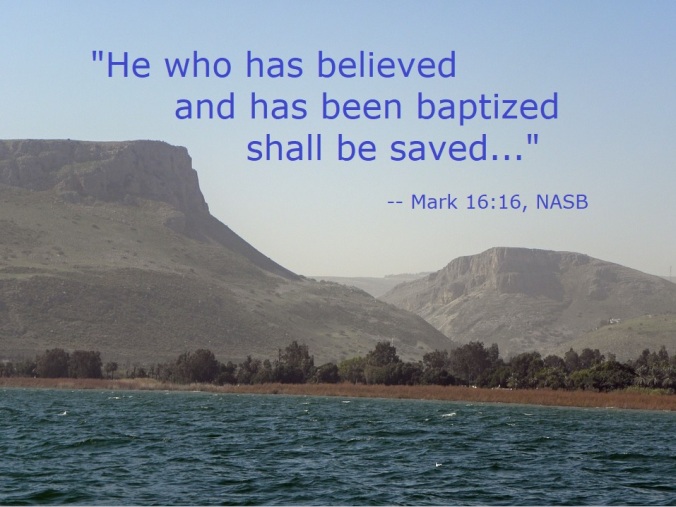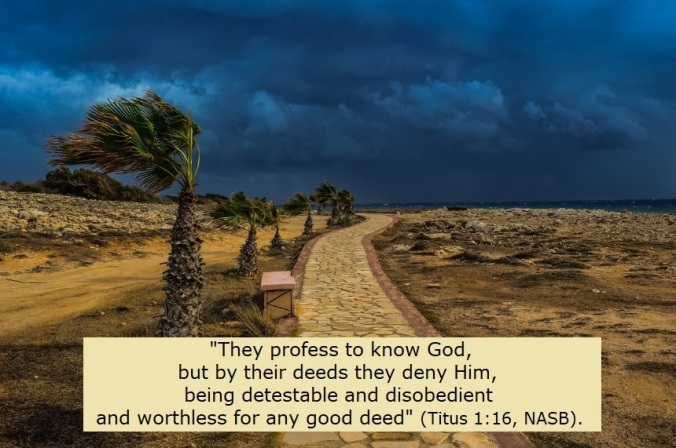“Go therefore and make disciples of all the nations…teaching them to observe all that I commanded you; and lo, I am with you always, even to the end of the age” (Matthew 28:19-20, NASB).
——————–
Contents:
1) Bible Lands: Philippi (Mike Hardin)
2) Challenges for the New Year (Greg Gwin)
——————–

-1-
Bible Lands: Philippi
Mike Hardin
The city of Philippi was in the first district of Macedonia, and the immediate destination of Paul and Silas upon reaching Macedonia. In Philippi, Paul and Silas successfully preached the gospel. They met and converted Lydia, “a seller of purple goods”; cast out an evil spirit; were scourged, jailed, and miraculously saved; converted the jailer and his household; and established the Lord’s church in this city.
Philippi received its name from its founder, Philip of Macedonia. In Acts 16:12, Luke refers to it as the leading city of Macedon, and also mentions its status as a Roman Colony. This status was a distinction in which the citizens of such a city took a great deal of pride, and this attitude is indicated by the complaint against Paul and his associates for seeking to introduce customs and practices contrary to the Roman pattern (Acts 16:21-26). Philippi was the place where Marcus Antonius and Octavius defeated Brutus and Cassius (42 B.C.), which defeat overthrew the Roman Oligarchy and Augustus (Octavius) became Emperor. This battle in large measure determined the fate of the Roman Republic, which became the Roman Empire. Roman soldiers settled in Philippi under the orders from Anthony and set aside the territory of Philippi as a Roman colony. The position of Philippi was that of an outpost or fortress whose principal business was to ward off barbarian hordes and to preserve the Roman peace on the edges of the empire. The military atmosphere may have kept away Jewish settlers, thus preventing the establishment of a synagogue.
Geographically, Philippi was an inland town situated about ten miles north of the Aegean seaport of Neapolis (modern Kavalla), from which it was separated by a continuous range of low lying hills. Philippi’s maritime interests, entering at Neapolis, were safeguarded by the construction of a Roman highway, a spur of the great Via Egnatia.
The Roman Empire gave civilization two major contributions, peace and a great road system. The Roman-built Via Egnatia was a great military highway. The strategic and commercially viable Via Egnatia ran along the north of Macedonia, connecting Dyrrhachium on the Adriatic Sea with Thessalonica near the Aegean Sea. This was the prime route between Italy and Asia Minor. The Via Egnatia is the most famous road in the Roman Empire, the main artery in southern Italy, and was constructed by the end of the second century B.C. The total length of the Via Egnatia was 535 Roman miles (493 English miles). Thessalonica and Philippi were the principal cities of Macedonia having access to the Via Egnatia. The road was paved and 15 feet across. On a road such as the Via Egnatia a person could travel about 25 Roman miles (1,614.6 yards) per day, depending upon whether he was walking or riding. The Via Egnatia was a great highway through which all the traders from east and west had to pass. Not only did the Via Egnatia make possible the economic boom that occurred in Paul’s day, but it played an important role in disseminating the gospel throughout Europe.
The Apostle Paul no doubt traveled the Via Egnatia between the cities of Philippi, Thessalonica, and Illyricum. Philippi for Paul was a strategic center for evangelizing Europe. It was well watered, in the midst of a very fertile territory, and close to it were some very rich gold mines.
The church at Philippi was established by Paul on his second Missionary journey, about A.D. 52. At Troas “a vision appeared to Paul in the night; there was a man of Macedonia standing and beseeching him, and saying, come over into Macedonia and help us; and when he had seen the vision straightway we sought to go further into Macedonia, concluding that God had called us to preach the gospel unto them” (Acts 16:6-10).
They sailed from Troas, and evidently, with a favorable wind, crossed the Aegean Sea in two days to Neapolis, a journey that would ordinarily have taken five days. From Neapolis they went up to Philippi. These circumstances: the vision at Troas, a ship being immediately available, and a favorable wind on his journey indicate that God was guiding Paul to the city of Philippi.
In Philippi, Paul and Silas “went outside the gate to the riverside, where they supposed there was a place of prayer.” One of the women, who heard them speak, was Lydia, “a seller of purple goods, who was a worshiper of God.” Lydia was from Thyatira in Asia Minor. Lydia and her household were baptized into Jesus Christ (Acts 16:12-15). The conversion of Lydia represented the establishment of the first church in Europe. One of the possible sites for the baptism of Lydia is the River Krenides near Philippi.
Paul and Silas were cast into prison in Philippi and converted the jailor and his household (Acts 16:16-34). Paul had a great love and appreciation for the children of God at Philippi.
— Via Truth Magazine, January 2007, Volume LI, Number 1, pp. 27-28
——————–

-2-
Challenges for the New Year
Greg Gwin
The beginning of a new year provides an excellent opportunity for us to pause, ponder, plan, and prepare for the future. We hope that the New Year will especially cause us all to think about our spiritual service to God and how we can improve in the fulfillment of our duties to Him. Let us challenge you in these specific areas:
– Spend more time in prayer. Don’t allow the day to begin or end without spending time in prayer to God. Throughout the day, stop and petition Him for help and strength. And, by all means, don’t just wait for a crisis to develop before you think to pray. “Pray without ceasing” (1 Thessalonians 5:17).
– Study your Bible more consistently. Use one of the available daily Bible reading schedules, or come up with your own plan to read on a regular basis. Don’t just rush through a few verses. Instead, really study the text to learn its meaning. Before you end a reading session, think about how you can make application of what you’ve read in a real and practical way. “Give attendance to reading . . .” (1 Timothy 4:13).
– Attend every Bible study and worship in this New Year. This, of course, is your duty — but it is also a privilege. BE HERE! Make this a high priority. Why would you not want to be present to worship God and study His Word? “Not forsaking the assembling of ourselves together . . .” (Hebrews 10:25).
– Teach the lost. We all have friends, neighbors, co-workers and family members who are lost in sin. They NEED us to share the gospel with them. Make a firm commitment to reach at least one of them with the “good news” this year. If each Christian would bring just one person to the Lord each year, we could soon convert the whole world. Let’s do it! “Go ye therefore and teach all nations . . . (Matthew 28:19).
– Live a pure, godly life. Nothing else matters if we are not living faithfully for the Lord. Think about this, and let it be manifested in how you talk, where you go, who you associate with, how you dress, etc. Others are looking to you, and evaluating Christianity on the basis of what they see of it in you. “Ye are the light of the world . . . let your light so shine before men, that they may see your good works, and glorify your Father which is in heaven” (Matthew 5:14-16).
In a very real sense, having a “Happy New Year” depends on how well you fulfill your spiritual duties to God. Think!
– Via The Beacon, December 30, 2018
——————–
The Steps That Lead to Eternal Salvation
1) Hear the gospel, for that is how faith comes (Rom. 10:17; John 20:30-31).
2) Believe in the deity of Christ (John 8:24; John 3:18).
3) Repent of sins (Luke 13:5; Acts 17:30).
4) Confess faith in Christ (Rom. 10:9-10; Acts 8:36-38).
5) Be baptized in water for the remission of sins (Mark 16:16; Acts 2:38; 22:16; Rom. 6:3-4; Gal. 3:26-27; 1 Pet. 3:21).
6) Continue in the faith, living for the Lord; for, if not, salvation can be lost (Heb. 10:36-39; Rev. 2:10; 2 Pet. 2:20-22).
——————–
Tebeau Street
CHURCH OF CHRIST
1402 Tebeau Street, Waycross, GA 31501
Sunday services: 9:00 a.m. (Bible class); 10 a.m. & 5 p.m. (worship)
Wednesday: 7 p.m. (Bible class)
evangelist/editor: Tom Edwards (912) 281-9917
Tom@ThomasTEdwards.com
http://thomastedwards.com/go (Older version of Gospel Observer website without pictures, but back to March 1990)
http://tebeaustreetchurchofchrist.org/
http://ThomasTEdwards.com/audioser.html (audio sermons)



















